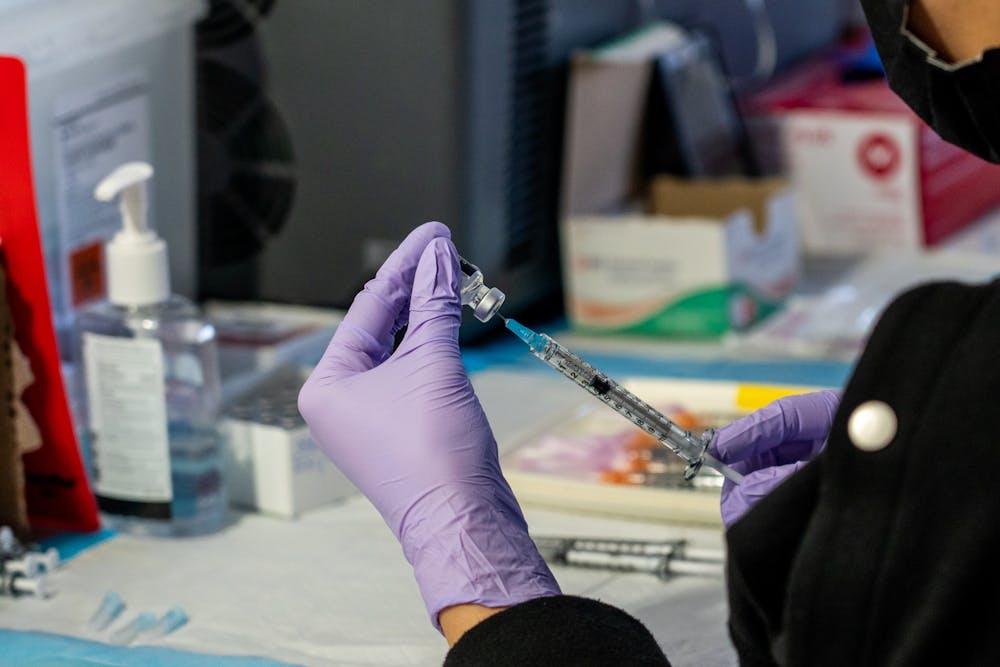Elon University faculty and student workers will be eligible to receive a COVID-19 vaccine beginning March 3, according to guidelines from the North Carolina Department of Health and Human Services.
Originally slated for March 10, this change comes after a press conference from Gov. Roy Cooper on March 2, announcing the rollout date change to March 3.
Dean of Students Jana Lynn Patterson verified with the NCDHHS on Feb. 24 that student staff qualified for the second part of North Carolina’s Group 3 of vaccine distribution.
“We did sit in on a meeting with the state [on Feb. 24] and we asked [the state] directly about student staff including RAs,” Pattterson said.
Though Patterson specifically clarified with the state regarding RAs and AMs, as long as student staff are employed on campus with an elevated risk of exposure to COVID-19, they are eligible for the vaccine in Group 3.
Despite Group 3 beginning on Feb. 24, Patterson said university faculty and support staff who didn’t already qualify for a shot would not be eligible for vaccine distribution until March 3.
“They are prioritizing K-12 teachers and support staff which started [Feb. 24],” Patterson said.
Starting March 3, other essential workers including university faculty, support staff and student staff.
Sophomore Nick Asprea is excited to receive the vaccine as an RA.
“Sometimes RAs are put in situations that other students aren’t,” Asprea said. “We encounter a lot of situations where there’s a lot of students around and that would probably be considered unsafe. Overall, I’m very encouraged that Elon is prioritizing the RAs.”
The university has also been approved to become a vaccine distribution site and will be able to directly provide vaccines to those in Group 3. Elon has not been allocated vaccine doses as of March 2. Vaccine shipments are delayed across the country due to winter weather and production shortages, causing states to adjust delivery schedules based on affected populations and regions.
When Elon receives vaccines designated for Group 3, the university is prepared with “a freezer, a separate refrigerator … and some really good capacity,” according to Patterson.
“Our focus and our priority is to as soon as we get notification that we’re going to get doses — we don’t know how many doses we’re going to get, we don’t know when we’ll get them — but when we get that notification we’re ready to administer vaccines to the best of our capacities,” Patterson said. “We have completed all of the steps in that process.”
Residence Life, Student Life and Human Resources are working to create a prioritization list based on job exposure risk. MarQuita Barker, Director of Residence Life, declined to be interviewed but wrote in an email that Elon is continuing to advocate for students, student workers, and faculty and staff.
While faculty, student staff and part-time support staff are covered in Group 3, Elon’s auxiliary staff — such as the dining hall workers — are not directly covered through the guidelines from the NCDHHS.
Elon is determined to find a way to include dining hall staff despite this lack of direct coverage.
“We are going to make it as broad as we can,” Patterson said. “We want our student staff to be protected just like our faculty and staff, whether they’re full-time or part-time. We’ll also include in our efforts our auxiliary staff, which is our dining staff, because we want them to be protected.”
Patterson said Elon must work within the direction provided by the state, saying the university aims to be as “comprehensive” as possible. It is for this reason that Elon cannot provide vaccines to students with preexisting conditions that make them high-risk, as those students are classified as Group 4. On March 2, Gov. Cooper announced that Group 4 will begin receiving vaccines on March 24. All other college students are in Group 5.
The state has not provided a comprehensive timeline for when Group 4 or Group 5 will begin, but Patterson is hopeful following the FDA’s approval of the Johnson & Johnson single-dose vaccine, stating that it is Elon’s “preference” for students.
However, Elon cannot require the COVID-19 vaccine the way it requires the flu shot due to the experimental nature of the new vaccines.
Elon will highly recommend that all students, faculty and staff receive the vaccine if they are able to.
“What I’ve heard from students is that they’re looking forward to getting the vaccine and want the vaccine,” Patterson said. “I think we’re going to have a higher rate of on-campus faculty and staff who take the vaccine. Again, they don’t have to take it, but we’ll encourage them to do it if their doctor approves it.”
For now, Elon continues to have guidelines on mask-wearing, physical distancing and limits on gatherings.


